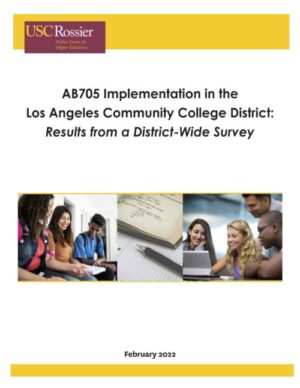For some time now, researchers — including those on our team — have shown that developmental education (DE) courses are generally ineffective, inefficient, and inequitable, especially for Black and brown students. To the authors and advocates of California Assembly Bill 705 (AB705), this research was convincing; they cited it to motivate the policy that the governor signed into law in fall 2017 and that went into effect in fall 2019.
Our mixed methods evaluation of AB705 in the Los Angeles Community College District (LACCD) included a district-wide survey that more than 500 faculty, staff and administrators completed. In our report, we showed that most were familiar with AB705 goals and were making significant changes to comply with the law, including reducing and in some cases eliminating DE course offerings. Yet, even as DE courses came off the books, we found that the majority of math and English faculty who responded to our survey continued to believe that DE courses effectively addressed the needs of students assessed as “underprepared” for transfer-level coursework. And in interviews we did with practitioners responsible for implementing AB705, we heard varying levels of lament over the elimination of DE courses–even from those who championed the policy.
Puzzled by these findings, which are echoed in research of reforms in other states that, like AB705, are encouraging the demise of DE courses and we delved into the reasons our interviewees gave for why DE courses still have a place in community colleges. Our full analysis and findings are featured in a working paper, “The logics that keep developmental education alive in an age of reform.” Interviewees shared a range of rationales in favor of DE courses that we grouped into three overarching logics:
1) a logic of basic educational competency (i.e., DE courses provide students with the foundational skills for success in college and beyond);
2) a logic of educational opportunity (i.e., DE courses are essential for community colleges’ open-access mission and their absence removes students’ opportunity to transition to college); and
3) a logic of choice (i.e., the choice for DE should be up to the faculty and/or to students).
With DE courses being eliminated in response to AB705, and with a new policy, Assembly Bill 1705, further shrinking the ground for DE in the California Community Colleges, why does it matter that some may continue to have logics in favor of DE?
First, logics point to the salience of practitioner thinking and beliefs in reform contexts. Even when a policy like AB705 mandates new rules around what community colleges can do with assessment and placement and with preparing students for college work, practitioners may institute changes that are grounded in logics that are at-odds with policy goals.
Second, logics matter because they offer some clues into what practitioners are navigating and juggling when faced with external demands to shift how they enact their professional ideals and do their work. Often, when practitioners express skepticism, policymakers and reformers may frame them as “resistant” to change. While that could well be true, it is important to recognize that community college practitioners are invested in advancing student success , even if they hesitate to adopt reforms that come from the outside or question research findings based on students from other colleges.
To ensure that policies are not implemented symbolically through surface-level changes, practitioner logics should not be ignored and practitioners should be provided with structured opportunities to assess their thinking and beliefs in light of reform goals.








